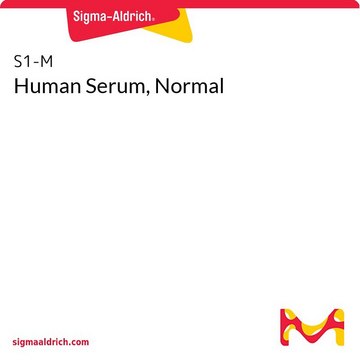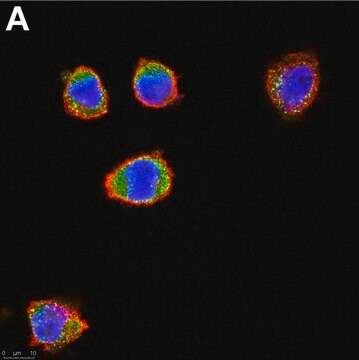MESC 18
11120816, mouse embryo, Adherent monolayer of spheroidal cells.
Sinonimo/i:
MESC-18, MESC18
Autenticatiper visualizzare i prezzi riservati alla tua organizzazione & contrattuali
About This Item
Codice UNSPSC:
41106514
Origine biologica:
mouse embryo
Modalità di accrescimento:
Adherent
Cariotipo:
XY, diploid
Morfologia:
Adherent monolayer of spheroidal cells.
Recettori:
Not specified
Prodotti consigliati
Nome del prodotto
MESC 18, 11120816
Origine biologica
mouse embryo
Modalità di accrescimento
Adherent
Cariotipo
XY, diploid
Morfologia
Adherent monolayer of spheroidal cells.
Recettori
Not specified
Cerchi prodotti simili? Visita Guida al confronto tra prodotti
Origine della linea cellulare
Mouse embryonic stem cell
Descrizione della linea cellulare
The germ-line competent cell line MESC 18 was established from the inner cell mass of a 3.5 day male pre-implantation mouse embryo (strain 129/Olac). These pluripotent cells retain the ability to participate in normal embryonic development. Differentiation of the cells is inhibited by Leukaemia Inhibiting Factor (LIF). Addition of LIF allows culture without the use of a feeder layer.
Profilo DNA
Not specified
Terreno di coltura
MEF medium consists of DMEM/F12, 10% FBS, 2 mM L-Glutamine (G7513) and 0.1 mM 2-Mercaptoethanol (M6250). KSR medium consists of DMEM, 20% Serum Replacer, 2 mM L-Glutamine (G7513), NEAA, 0.1 mM 2-Mercaptoethanol (M6250) and 1000 Units/ml LIF.
Mantenimento delle subcolture
The MESC lines can be grown without the use of mitotically inactivated feeder cells (Brown et al., 1992 PMID: 1483967). However, the cells supplied by Sigma have been grown on mitomycin treated primary mouse embryonic fibroblasts to ensure the cells are maintained in an undifferentiated state. Mouse embryonic fibroblasts, STO (Sigma product number 86032003) or SNL 76/7 (Sigma product number 07032801) can be used. At ECACC plastic ware is pre-coated with gelatine prior to plating feeder cells. Porcine gelatine (Sigma G1890) is dissolved in sterile water (0.5 g/500 ml) at 56◦C. The 0.1% solution is sterilized by filtration (0.22 μm). Add 0.1% gelatine to plastic ware to cover bottom, and incubate for 20 minutes at room temperature. Remove gelatine, wash with PBS once and replace with appropriate culture medium. The flask/dish must not be allowed to dry out. Feeder layers are prepared on the gelatinized flasks at least 24 hours in advance of being required. An ampoule is thawed in 37 °C water bath and the contents quickly transferred to a 15 ml centrifuge tube. MEF medium is added drop wise to 5 ml. Cells are centrifuged at 150 x g for 5 minutes at Room Temperature (RT). Cells are resuspended in 5 ml of MEF medium. Cells are counted and added to flasks containing the correct medium at 1-3 x 104 cells/cm2.An ampoule of ES cells is thawed in 37 °C water bath and the contents quickly transferred to a 15 ml centrifuge tube. KSR medium is added drop wise to 5 ml. Cells are centrifuged at 150 x g for 5 minutes. Cells are resuspended in 5 ml of KSR medium. The prepared feeder flask is washed once with PBS and KSR medium added. ES cells should be plated at 4-5 x 104 cells/cm2. Cultures must be incubated in a humidified 5% CO2/95% air incubator at 37 °C. A 100% media change must be performed every day and cells passaged every 2-3 days. Colonies must not be allowed to touch each other as overgrowth will result in differentiation.
Altre note
Additional freight & handling charges may be applicable for Asia-Pacific shipments. Please check with your local Customer Service representative for more information.
Scegli una delle versioni più recenti:
Certificati d'analisi (COA)
Lot/Batch Number
Ci dispiace, ma al momento non ci sono COA disponibili online per questo prodotto.
Se ti serve aiuto, non esitare a contattarci Servizio Clienti
Possiedi già questo prodotto?
I documenti relativi ai prodotti acquistati recentemente sono disponibili nell’Archivio dei documenti.
Il team dei nostri ricercatori vanta grande esperienza in tutte le aree della ricerca quali Life Science, scienza dei materiali, sintesi chimica, cromatografia, discipline analitiche, ecc..
Contatta l'Assistenza Tecnica.






